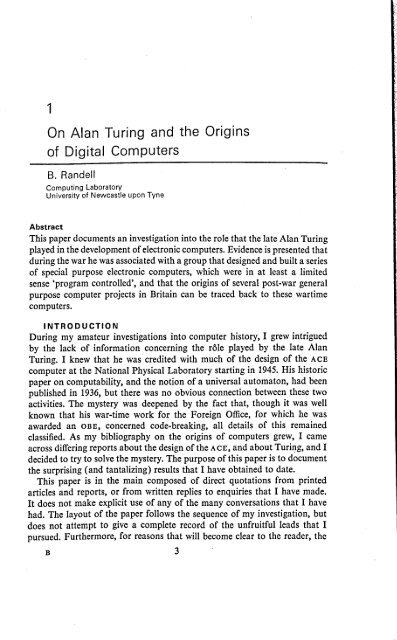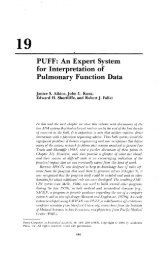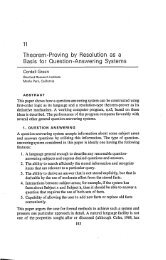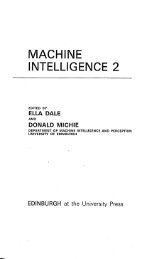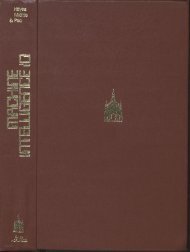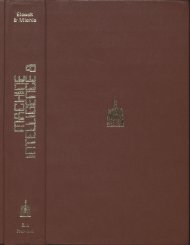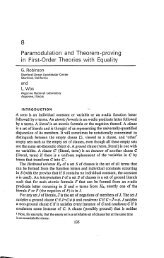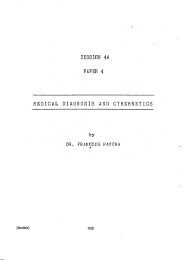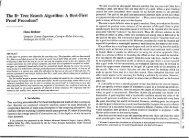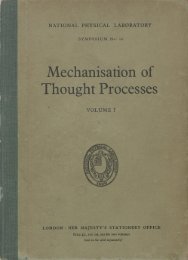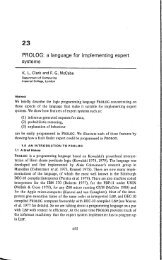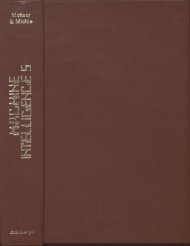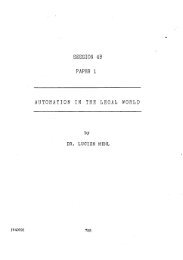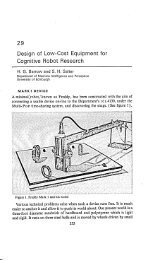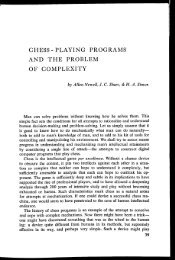- Page 1 and 2: 114; tt.t. 1 s
- Page 3: MACHINE INTELLIGENCE 7
- Page 6 and 7: © 1972 Edinburgh University Press
- Page 8 and 9: PREFACE the speed of calculation is
- Page 10 and 11: PREFACE them on the shelves until t
- Page 13 and 14: CONTENTS INTRODUCTION xiii PREHISTO
- Page 15 and 16: INTRODUCTION Among the many propert
- Page 17: PREHISTORY
- Page 21 and 22: RANDELL From Dr Herman H. Goldstine
- Page 23 and 24: RANDELL propose a changeable progra
- Page 25 and 26: RANDELL been sworn to secrecy. Thus
- Page 27 and 28: RANDELL because of the enhanced pos
- Page 29 and 30: RANDELL to the extent of providing
- Page 31 and 32: RANDELL ley, I may be wrong . . . D
- Page 33 and 34: RANDELL gram computer to operate wa
- Page 35 and 36: RAND ELL Phillips, E.W. (1965b) Pre
- Page 37: PROGRAM PROOF AND MANIPULATION
- Page 40 and 41: PROGRAM PROOF AND MANIPULATION x: =
- Page 42 and 43: PROGRAM PROOF AND MANIPULATION Si I
- Page 44 and 45: PROGRAM PROOF AND MANIPULATION (c)
- Page 46 and 47: PROGRAM PROOF AND MANIPULATION We d
- Page 48 and 49: PROGRAM PROOF AND MANIPULATION By w
- Page 50 and 51: PROGRAM PROOF AND MANIPULATION Figu
- Page 52 and 53: PROGRAM PROOF AND MANIPULATION Cons
- Page 54 and 55: PROGRAM PROOF AND MANIPULATION m=CO
- Page 56 and 57: • • PROGRAM PROOF AND MANIPULAT
- Page 58 and 59: PROGRAM PROOF AND MANIPULATION also
- Page 60 and 61: PROGRAM PROOF AND MANIPULATION (Tit
- Page 62 and 63: PROGRAM PROOF AND MANIPULATION j=RE
- Page 64 and 65: PROGRAM PROOF AND MANIPULATION Figu
- Page 66 and 67: PROGRAM PROOF AND MANIPULATION The
- Page 68 and 69:
PROGRAM PROOF AND MANIPULATION comp
- Page 70 and 71:
PROGRAM PROOF AND MANIPULATION •
- Page 72 and 73:
PROGRAM PROOF AND MANIPULATION find
- Page 74 and 75:
PROGRAM PROOF AND MANIPULATION wher
- Page 76 and 77:
PROGRAM PROOF AND MANIPULATION TCMP
- Page 78 and 79:
PROGRAM PROOF AND MANIPULATION (G1.
- Page 80 and 81:
PROGRAM PROOF AND MANIPULATION Diff
- Page 82 and 83:
PROGRAM PROOF AND MANIPULATION APPE
- Page 84 and 85:
PROGRAM PROOF AND MANIPULATION CA 0
- Page 86 and 87:
PROGRAM PROOF AND MANIPULATION IIII
- Page 89 and 90:
4 Building-in Equational Theories G
- Page 91 and 92:
PLOTKIN be carried through using th
- Page 93 and 94:
PLOTKIN constants — the numerals
- Page 95 and 96:
PLOTKIN We use the equality symbol
- Page 97 and 98:
PLOTKIN If /(S)> 0, there is a lite
- Page 99 and 100:
PLOTKIN from Var (82) u V and for e
- Page 101 and 102:
and terms ti, ui (i=1, n), t, u, v'
- Page 103 and 104:
PLOTKIN not checked, one can obtain
- Page 105 and 106:
PLOTKIN infinite set of refutations
- Page 107 and 108:
5 Theorem Proving in Arithmetic wit
- Page 109 and 110:
COOPER Step 3 Simplify each relatio
- Page 111 and 112:
COOPER but F(x0) is true, then at l
- Page 113 and 114:
COOPER where R1, . R. are arithmeti
- Page 115:
COOPER amples with the same relatio
- Page 118 and 119:
COMPUTATIONAL LOGIC the resolvent R
- Page 120 and 121:
COMPUTATIONAL LOGIC The value of th
- Page 122 and 123:
COMPUTATIONAL LOGIC The value of TE
- Page 124 and 125:
COMPUTATIONAL LOGIC (z, 7 . (f x y)
- Page 126 and 127:
COMPUTATIONAL LOGIC GETLIT(CL,K). G
- Page 128 and 129:
01001 IVNOIIVII1dPIO3 c4 c6 c3 ((+(
- Page 130 and 131:
COMPUTATIONAL LOGIC the figure exhi
- Page 132 and 133:
COMPUTATIONAL LOGIC structure shari
- Page 134 and 135:
COMPUTATIONAL LOGIC A clause is a H
- Page 136 and 137:
COMPUTATIONAL LOGIC resolution have
- Page 138 and 139:
COMPUTATIONAL LOGIC It should be no
- Page 140 and 141:
• COMPUTATIONAL LOGIC Since both
- Page 142 and 143:
COMPUTATIONAL LOGIC assumption, m +
- Page 144 and 145:
COMPUTATIONAL LOGIC generated by th
- Page 146 and 147:
COMPUTATIONAL LOGIC are two (not ne
- Page 148 and 149:
COMPUTATIONAL LOGIC Since these two
- Page 150 and 151:
COMPUTATIONAL LOGIC Figure 1. Loop
- Page 152 and 153:
COMPUTATIONAL LOGIC talking about u
- Page 155:
INFERENTIAL AND HEURISTIC SEARCH
- Page 158 and 159:
INFERENTIAL AND HEURISTIC SEARCH de
- Page 160 and 161:
INFERENTIAL AND HEURISTIC SEARCH mu
- Page 162 and 163:
INFERENTIAL AND HEURISTIC SEARCH by
- Page 164 and 165:
INFERENTIAL AND HEURISTIC SEARCH ti
- Page 166 and 167:
INFERENTIAL AND HEURISTIC SEARCH co
- Page 168 and 169:
INFERENTIAL AND HEURISTIC SEARCH co
- Page 170 and 171:
C) o o C) ri\41 141‘ • • —
- Page 172 and 173:
INFERENTIAL AND HEURISTIC SEARCH ne
- Page 174 and 175:
INFERENTIAL AND HEURISTIC SEARCH Mo
- Page 176 and 177:
INFERENTIAL AND HEURISTIC SEARCH Ta
- Page 178 and 179:
INFERENTIAL AND HEURISTIC SEARCH Ac
- Page 180 and 181:
INFERENTIAL AND HEURISTIC SEARCH Q
- Page 183 and 184:
10 And-or Graphs, Theorem-proving G
- Page 185 and 186:
KOWALSKI specify a search space of
- Page 187 and 188:
KOWALSKI sharing a single copy of a
- Page 189 and 190:
KOWALSKI A derivation D is a finite
- Page 191 and 192:
KOWALSKI goals to be solved simulta
- Page 193 and 194:
KOWALSKI to select and generate can
- Page 195 and 196:
KOWALSKI Figure 5. The search space
- Page 197 and 198:
KOWALSKI (1) size, the number of se
- Page 199 and 200:
KOWALSKI =h. A diagonal search stra
- Page 201 and 202:
KOWALSKI Theorem do not specify wha
- Page 203 and 204:
KOWALSKI solution path whose additi
- Page 205 and 206:
KOWALSKI carry no indication of how
- Page 207 and 208:
KOWALSKI within which unit preferen
- Page 209 and 210:
KOWALSKI municating special-purpose
- Page 211 and 212:
11 An Approach to the Frame Problem
- Page 213 and 214:
SAND EWALL principle be re-proved f
- Page 215 and 216:
SANDEWALL used in the reasoning pro
- Page 217 and 218:
SANDEWALL A Unless B and if we wish
- Page 219 and 220:
SANDEWALL during the planning phase
- Page 221 and 222:
12 A Heuristic Solution to the Tang
- Page 223 and 224:
DEUTSCII AND HAYES puzzles is Read'
- Page 225 and 226:
DEUTSCH AND HAYES application of al
- Page 227 and 228:
DEUTSCH AND HAYE quite early on tha
- Page 229 and 230:
DEUTSCH AND HAYES subpuzzles do not
- Page 231 and 232:
DEUTSCII AND IIAYES vertices (or no
- Page 233 and 234:
• • DEUTSCH AND HAYES • • .
- Page 235 and 236:
DEUTSCH AND HAYES 2 2 2 2 2 • III
- Page 237 and 238:
DEUTSCH AND HAYES pieces. Puzzle pi
- Page 239 and 240:
DEUTSCH AND HAYES fully described b
- Page 241 and 242:
DEUTSCH AND HAYES be fitted into ar
- Page 243 and 244:
(2) ciwool] S3s111a.03 1 2110.0102
- Page 245 and 246:
DEUTSCH AND HAYES 4.9 Puzzle pieces
- Page 247 and 248:
DEUTSCH AND IIAYES r-> direct-match
- Page 249 and 250:
DEUTSCII AND HAYES The rules of low
- Page 251 and 252:
• .• DEUTSCH AND HAYES It will
- Page 253 and 254:
DEUTSCH AND HAYES X .---- x+ I dire
- Page 255 and 256:
DEUTSCII AND HAYES •• • •
- Page 257 and 258:
13 A Man-Machine Approach for Creat
- Page 259 and 260:
KROLAK AND NELSON those who exhibit
- Page 261 and 262:
KROLAK AND NELSON normally we expec
- Page 263 and 264:
KROLAK AND NELSON tried to capture
- Page 265 and 266:
KROLAK AND NELSON V.S.P. 1967) on r
- Page 267 and 268:
KROLAK AND NELSON generated overlay
- Page 269 and 270:
KROLAK AND NELSON allowed to be zer
- Page 271 and 272:
KROLAK AND NELSON Table 1. Loads an
- Page 273 and 274:
▪ ts.) Schoo▪ • , •) indica
- Page 275 and 276:
Figure 3. Modified initial estimate
- Page 277 and 278:
t.) 1 I ■ 1 -- to School 1 --- to
- Page 279 and 280:
KROLAK AND NELSON Cost =7301.62 o o
- Page 281 and 282:
KROLAK AND NELSON Collins, J.S. (19
- Page 283 and 284:
14 Heuristic Theory Formation: Data
- Page 285 and 286:
BUCHANAN, FEIGENBAUM AND SRIDHARAN
- Page 287 and 288:
BUCHANAN, FEIGENBAUM AND SRIDIIARAN
- Page 289 and 290:
BUCHANAN, FEIGENBAUM AND SRIDIIARAN
- Page 291 and 292:
BUCHANAN, FEIGENBAUM AND SRIDIIARAN
- Page 293 and 294:
BUCHANAN, FEIGENBAUM AND SRIDIIARAN
- Page 295 and 296:
BUCHANAN, FEIGENBAUM AND SRIDHARAN
- Page 297 and 298:
BUCHANAN, FEIGENBAUM AND SRIDIIARAN
- Page 299 and 300:
BUCHANAN, FEIGENBAUM AND SRIDHARAN
- Page 301 and 302:
BUCHANAN, FEIGENBAUM AND SRIDHARAN
- Page 303 and 304:
BUCHANAN, FEIGENBAUM AND SRIDIIARAN
- Page 305 and 306:
BUCHANAN, FEIGENBAUM AND SRIDHARAN
- Page 307:
PERCEPTUAL AND LINGUISTIC MODELS
- Page 310 and 311:
PERCEPTUAL AND LINGUISTIC MODELS An
- Page 312 and 313:
PERCEPTUAL AND LINGUISTIC MODELS Re
- Page 314 and 315:
PERCEPTUAL AND LINGUISTIC MODELS al
- Page 316 and 317:
PERCEPTUAL AND LINGUISTIC MODELS fo
- Page 318 and 319:
PERCEPTUAL AND LINGUISTIC MODELS RE
- Page 320 and 321:
PERCEPTUAL AND LINGUISTIC MODELS "T
- Page 322 and 323:
PERCEPTUAL AND LINGUISTIC MODELS TR
- Page 324 and 325:
PERCEPTUAL AND LINGUISTIC MODELS no
- Page 326 and 327:
PERCEPTUAL AND LINGUISTIC MODELS Pr
- Page 328 and 329:
PERCEPTUAL AND LINGUISTIC MODELS de
- Page 330 and 331:
PERCEPTUAL AND LINGUISTIC MODELS di
- Page 332 and 333:
PERCEPTUAL AND LINGUISTIC MODELS it
- Page 334 and 335:
PERCEPTUAL AND LINGUISTIC MODELS (0
- Page 336 and 337:
PERCEPTUAL AND LINGUISTIC MODELS 9a
- Page 338 and 339:
PERCEPTUAL AND LINGUISTIC MODELS fr
- Page 340 and 341:
PERCEPTUAL AND LINGUISTIC MODELS in
- Page 342 and 343:
PERCEPTUAL AND LINGUISTIC MODELS ex
- Page 344 and 345:
PERCEPTUAL AND LINGUISTIC MODELS Th
- Page 346 and 347:
PERCEPTUAL AND LINGUISTIC MODELS di
- Page 348 and 349:
PERCEPTUAL AND LINGUISTIC MODELS My
- Page 350 and 351:
PERCEPTUAL AND LINGUISTIC MODELS BR
- Page 352 and 353:
PERCEPTUAL AND LINGUISTIC MODELS se
- Page 354 and 355:
PERCEPTUAL AND LINGUISTIC MODELS I
- Page 357 and 358:
18 The Syntactic Inference Problem
- Page 359 and 360:
HERMAN AND WALKER 1971a,b). In this
- Page 361 and 362:
HERMAN AND WALKER For any DpxL-sche
- Page 363 and 364:
HERMAN AND WALKER symbols from Go o
- Page 365 and 366:
HERMAN AND WALKER facts arise which
- Page 367 and 368:
HERMAN AND WALKER of strings which
- Page 369 and 370:
HERMAN AND WALKER We shall demonstr
- Page 371 and 372:
HERMAN AND WALKER unbounded growth
- Page 373 and 374:
19 Parallel and Serial Methods of P
- Page 375 and 376:
W1LLSHAW AND BUNEMAN Each pattern i
- Page 377 and 378:
WILLSHAW AND BUNEMAN this means tha
- Page 379 and 380:
WILLSHAW AND BUNEMAN 4. GRAPHICAL R
- Page 381 and 382:
WILLSHAW AND BUNEMAN (3) Given a se
- Page 383:
WILLSHAW AND BUNEMAN taking the for
- Page 386 and 387:
PERCEPTUAL AND LINGUISTIC MODELS be
- Page 388 and 389:
PERCEPTUAL AND LINGUISTIC MODELS (a
- Page 390 and 391:
PERCEPTUAL AND LINGUISTIC MODELS R=
- Page 392 and 393:
PERCEPTUAL AND LINGUISTIC MODELS Us
- Page 394 and 395:
PERCEPTUAL AND LINGUISTIC MODELS co
- Page 396 and 397:
PERCEPTUAL AND LINGUISTIC MODELS on
- Page 398 and 399:
PERCEPTUAL AND LINGUISTIC MODELS wi
- Page 400 and 401:
PERCEPTUAL AND LINGUISTIC MODELS Fi
- Page 403:
PROBLEM-SOLVING AUTOMATA
- Page 406 and 407:
PROBLEM-SOLVING AUTOMATA drawn from
- Page 408 and 409:
PROBLEM-SOLVING AUTOMATA vi(fZ, .,
- Page 410 and 411:
PROBLEM-SOLVING AUTOMATA with the d
- Page 412 and 413:
PROBLEM-SOLVING AUTOMATA Consider t
- Page 414 and 415:
PROBLEM-SOLVING AUTOMATA of the equ
- Page 416 and 417:
PROBLEM-SOLVING AUTOMATA estimate t
- Page 418 and 419:
PROBLEM-SOLVING AUTOMATA automata--
- Page 420 and 421:
PROBLEM-SOLVING AUTOMATA automata -
- Page 423 and 424:
23 Some New Directions in Robot Pro
- Page 425 and 426:
FIKES, HART AND NILSSON to be achie
- Page 427 and 428:
FIKES, HART AND NILSSON There are s
- Page 429 and 430:
FIKES, HART AND NILSSON (2) The rea
- Page 431 and 432:
FIKES, HART AND NILSSON To progress
- Page 433 and 434:
FIKES, HART AND NILSSON actions of
- Page 435 and 436:
FIKES, HART AND NILSSON posed by a
- Page 437 and 438:
FIKES, HART AND NILSSON indicates t
- Page 439 and 440:
FIKES, HART AND NILSSON CHECKDOOR (
- Page 441 and 442:
FIKES, HART AND NILSSON To make the
- Page 443 and 444:
FIKES, HART AND NILSSON team robot
- Page 445 and 446:
FIKES, HART AND NILSSON posed in pr
- Page 447 and 448:
FIKES, HART AND NILSSON definer is
- Page 449 and 450:
24 The MIT Robot P. H. Winston Arti
- Page 451 and 452:
WINsTON ARROW FORK PSI Figure 2. Th
- Page 453 and 454:
WINSTON Figure 6. The fork vertex c
- Page 455 and 456:
WINSTON time. The issue was avoided
- Page 457 and 458:
WINSTON Given this fact a simple se
- Page 459 and 460:
WINSTON less ambiguity than does a
- Page 461 and 462:
WINSTON Each action module is charg
- Page 463 and 464:
WINSTON mysterious at first. But, l
- Page 465 and 466:
WINSTON alternative of using clues
- Page 467 and 468:
WINSTON generates in the machine an
- Page 469 and 470:
WINSTON objects and the pointers re
- Page 471 and 472:
WINSTON current implementation, dif
- Page 473 and 474:
WINSTON better by devising a little
- Page 475 and 476:
WINSTON 2. A large network of progr
- Page 477 and 478:
WINSTON FIND-ALTITUDE. This determi
- Page 479 and 480:
FIND-DIMENSIONS WINSTON MANIPULATE
- Page 481:
WINSTON Hewitt, C. (1972) Descripti
- Page 484 and 485:
PROBLEM-SOLVING AUTOMATA the system
- Page 486 and 487:
PROBLEM-SOLVING AUTOMATA Figure I I
- Page 488 and 489:
PROBLEM-SOLVING AUTOMATA resolution
- Page 490 and 491:
PROBLEM-SOLVING AUTOMATA Unit A pla
- Page 492 and 493:
PROBLEM-SOLVING AUTOMATA rotate abo
- Page 494 and 495:
PROBLEM-SOLVING AUTOMATA HREG(N); R
- Page 496 and 497:
PROBLEM-SOLVING AUTOMATA • DISPLA
- Page 498 and 499:
PROBLEM-SOLVING AUTOMATA the ii316
- Page 500 and 501:
INDEX Deutsch 205-40 grammar 293-5,
- Page 502 and 503:
• INDEX Pavlidis 307, 323 Paz 352


